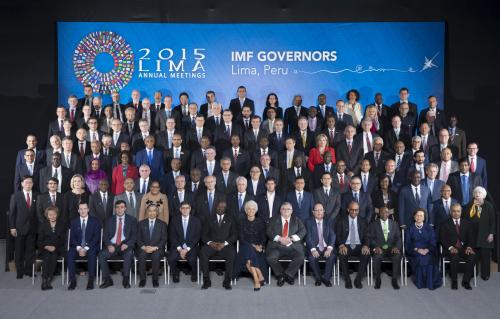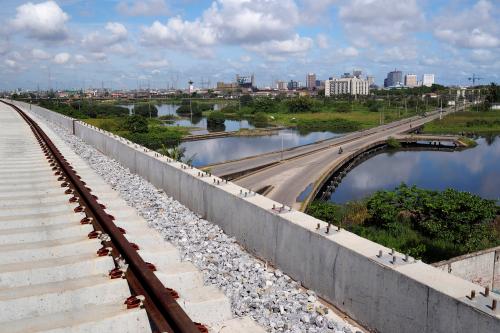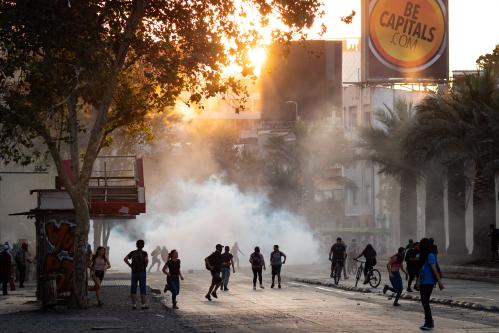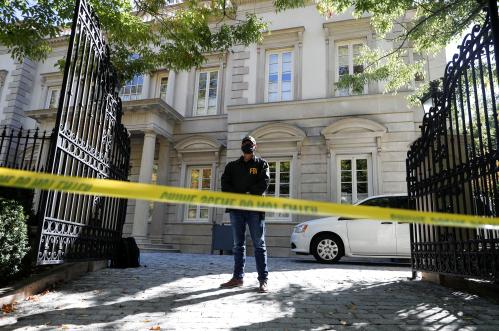World Bank Group publishes Doing Business 2017, and IMF releases Regional Economic Outlook
This week, the World Bank Group released its annual report on the state of countries’ business environments, Doing Business 2017. According to the report, Mauritius is the top-performing African country (ranked 49 out of 190 total countries). The continent has seen great improvements, for example the average number of days needed to start a business dropped from 37 to 27 in five years. The continent is also the second-highest adopter of reforms, behind Europe and Central Asia. Some examples of said reforms include introducing and improving data portals in Nigeria, Rwanda, and South Africa. There were also notable reforms in trade policy as Niger, for instance, eliminated of mandatory pre-shipment inspections for imported goods. For a second consecutive year, Kenya was among the top 10 improvers. This year, Kenya accelerated the electricity provision process as it introduced a geographic information system which got rid of the need for a site visit and reduced the time for grid connection by 2 weeks. One key addition to this year’s edition is the publication’s reporting of data on Somalia. Another important change is the addition of a gender component, showcasing the extra number of steps women must take in order to set up a business. For instance, there are several countries in which women need a husband’s explicit permission to start a business, one of which is the Democratic Republic of the Congo.
Also this week, the International Monetary Fund released is semi-annual Regional Economic Outlook on sub-Saharan Africa, which notes that, with a projected 1.4 percent growth rate for 2016, the continent is experiencing its lowest growth rate in 20 years. The report focuses on three different themes. The first theme in the report looks at the continent’s multispeed growth—the notion that the low growth story is not uniform across sub-Saharan Africa. Non-resource-rich countries are performing relatively well, with Côte d’Ivoire, Ethiopia, Kenya, and Senegal growing at rates that surpass 6 percent. The report advises oil exporters to allow their exchange rates to absorb the shocks and tighten the monetary policy in order to curb inflation. The second theme of the report is the state of the exchange rate regimes in sub-Saharan Africa. The report finds that countries with pegged exchange rates are growing 1 to 2 percentage points slower than countries with flexible exchange rate regimes. The report advises countries with a pegged regime to improve competitiveness and adopt growth-friendly fiscal reforms. For flexible exchange rate regimes, the report suggests creating a monetary policy that focuses on price stability, and adopting fiscal and monetary policies to contain inflation. The third theme of the report is enhancing resilience to natural disasters in sub-Saharan Africa. In recent months, the subcontinent has suffered from a climate-change-enhanced drought. The continent’s high reliance on rain-fed agriculture, poor resilience, and lack of insurance have made it more vulnerable to natural disasters. The report calls for the implementation of early warning systems, increasing resiliency in the agricultural sector, promoting economic diversification, and increasing cost-effective insurance.
Burundi, South Africa, and the Gambia announce intentions to leave the International Criminal Court while Kenya weighs its options
This week, a handful of sub-Saharan African countries announced their intention to leave the International Criminal Court. On Wednesday, Burundi officially informed the United Nations that it will be leaving the International Criminal Court. The small country’s parliament had voted in early October to leave the ICC, declaring that the ICC has disproportionately targeted sub-Saharan African countries for politically motivated reasons. Not all experts agree, however; as Elise Keppler of Human Rights Watch hinted, “Burundi’s decision to withdraw from the court may be related to allegations of ongoing abuses in the country since President Pierre Nkurunziza’s controversial bid for a third term last year.”
Also this week, South Africa’s largest opposition party, the Democratic Alliance, announced its intention to counter its government’s decision to leave the ICC in the South African Constitutional Court. South Africa, which formally announced its withdrawal on October 19, states that membership in the ICC violates its diplomatic immunity laws. The country had first raised objections to the ICC last year when it refused to implement an ICC arrest warrant of Sudanese President Omar al-Bashir who is under indictment for war crimes and genocide.
On Tuesday, Gambia announced its intention to leave the ICC as well. Like in Burundi, the Gambian government accused the court of targeting African countries. Information Minister Sheriff Bojang emphasized this point, stating, “This action is warranted by the fact that the ICC, despite being called the International Criminal Court, is in fact an International Caucasian Court for the persecution and humiliation of people of color, especially Africans.” He added, “There are many Western countries, at least 30, that have committed heinous war crimes against independent sovereign states and their citizens since the creation of the ICC and not a single Western war criminal has been indicted.” On the other hand, human rights groups warn that this move will allow President Yahya Jammeh to more easily crack down on political opponents during the elections this December.
Also this week, Kenyan presidential spokesman Manoah Esipisu stated that the country’s cabinet has not yet decided whether or not to withdraw from the ICC. This is not the first time the issue has been on the table, as in 2010 and 2013 the Kenyan Parliament issued resolutions for withdrawal. President Uhuru Kenyatta had been indicted for crimes against humanity for the post-election 2007-2008 violence, but the charges were eventually dropped.
Critics of the decisions to leave have left dire warnings. In a recent article, The Christian Science Monitor explores the relevancy of the court as countries leave, and Don Bosco, in the Chicago Tribune, questions whether the ICC is “crumbling,” citing criticism from Uganda and Ethiopia, among others. Human Rights Watch Africa researcher, Dewa Mavhinga, noted that these defections might be the start of a “runaway train,” as Newsweek questioned which countries might just be next. Most seriously, though, former ICC Chief Prosecutor Luis Moreno Ocampo has stated, “The chaos is coming. Genocide in Burundi and a new African war are in motion.”
South African “mini-budget” speech highlights spending cuts and education
On Wednesday, South African Finance Minister Pravin Gordhan presented to the South African Parliament the Medium-Term Budget Policy Statement (MTBPS) (or mini-budget speech), which provided an update on the national budget delivered in February and described the country’s evolving economic context, fiscal policy goals, and government allocations for the next three years. Given that South Africa’s sovereign credit rating is up for review by Fitch, Moody’s, and Standard & Poor’s ratings agencies by the end of the year, this mid-term budget speech provided an opportunity for the minister to convince South Africans and international investors alike that the economy is reforming and progressing, the Mail & Guardian reports. The speech, however, painted a bleak picture of the South African economy: Growth projections for 2016 were lowered from 0.9 percent in February to 0.5 percent, and the budget deficit forecast for 2016/2017 widened from 3.2 percent of GDP to 3.4 percent of GDP. To reduce the budget shortfalls, Gordhan proposed new measures to reduce expenditures by an additional 26 billion rand and increase revenues by 43 billion over the next two years. Furthermore, in light of recent protests to improve access to higher education and eliminate university fees, the government will allocate an extra 17 billion rand ($1.2 billion) to universities to keep costs from rising, Gordhan stated.






Commentary
Africa in the news: Doing Business 2017 and Regional Economic Outlook for Africa published, ICC loses 3 African members and South Africa releases midterm budget
October 28, 2016